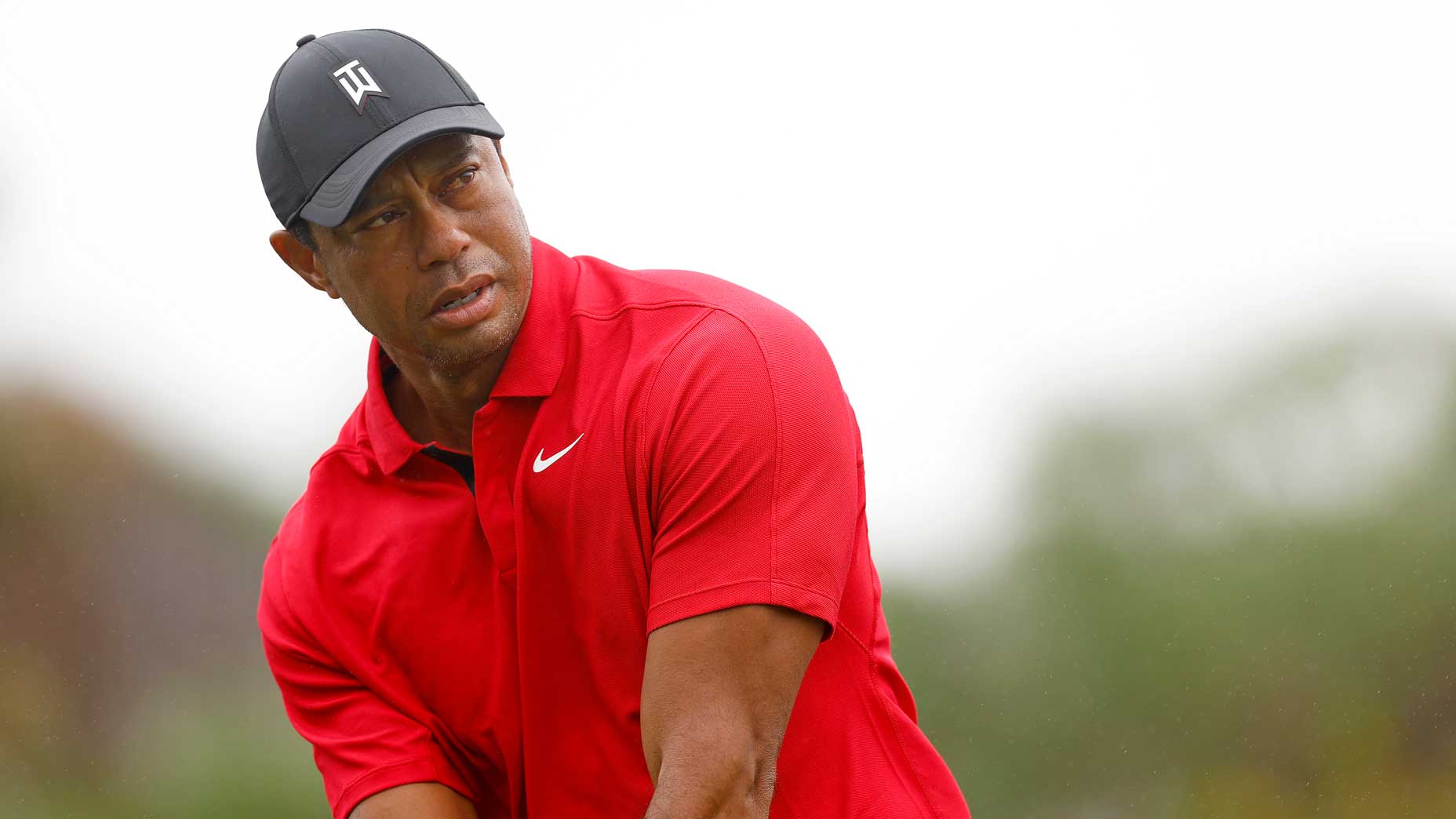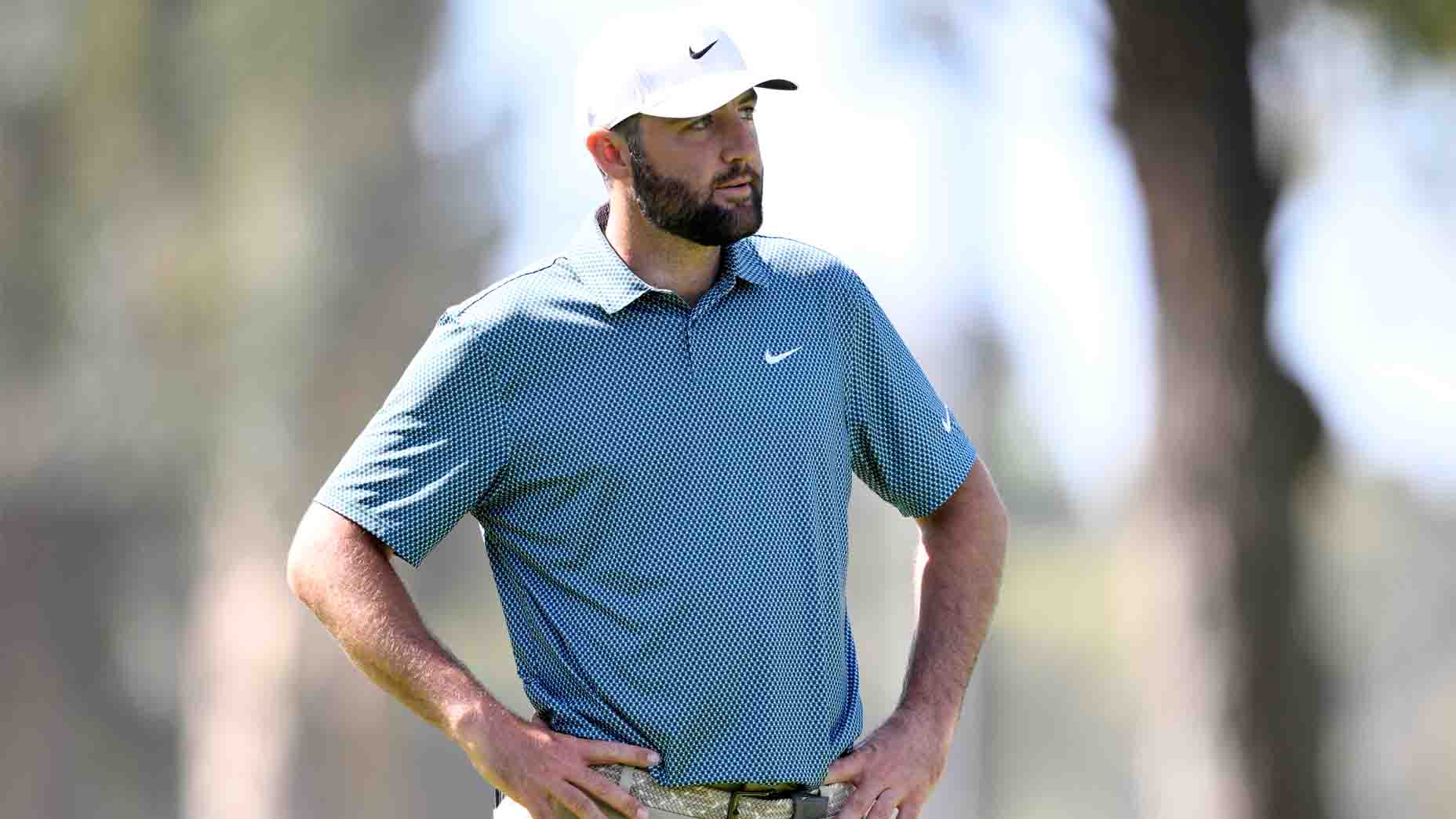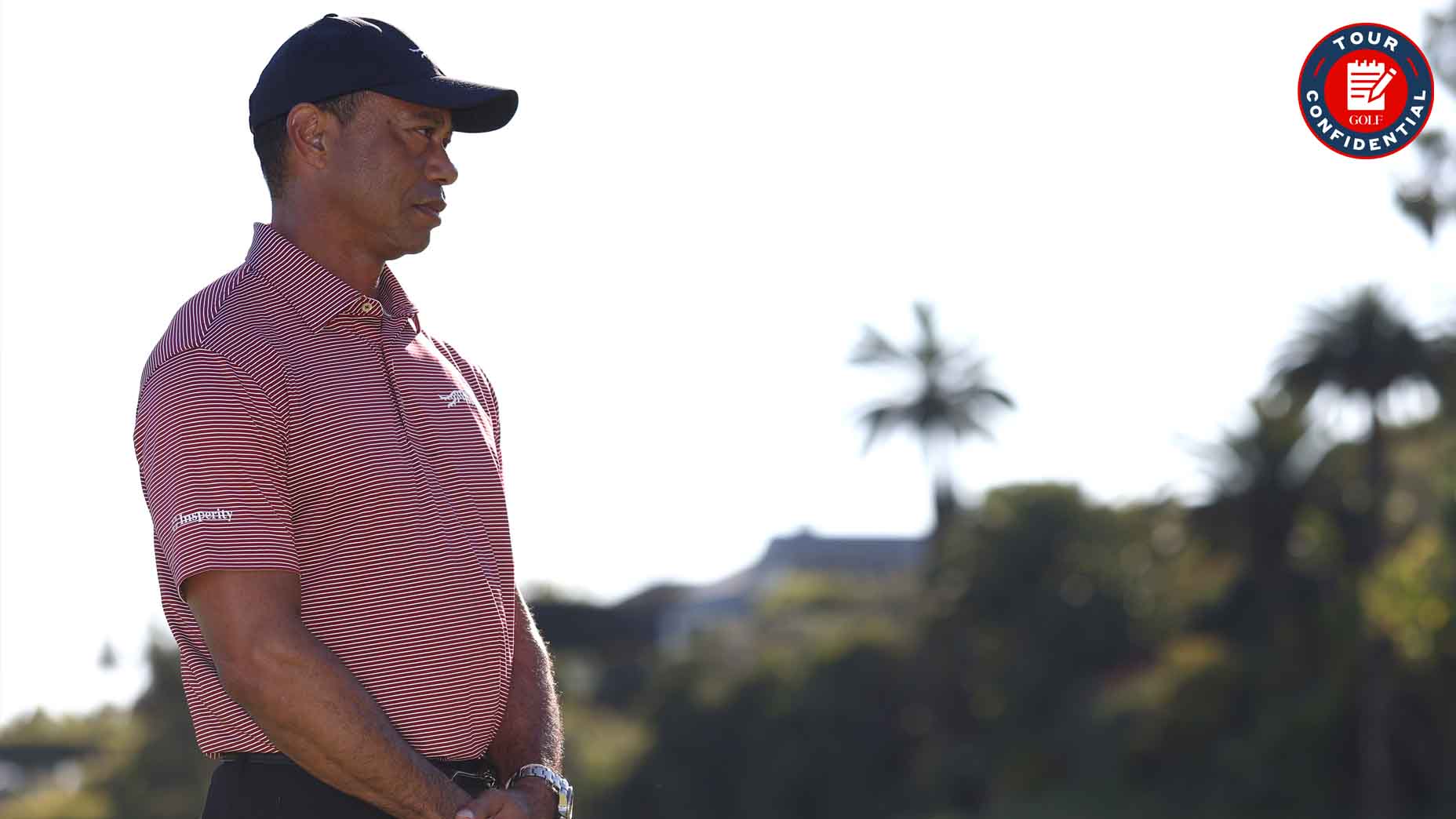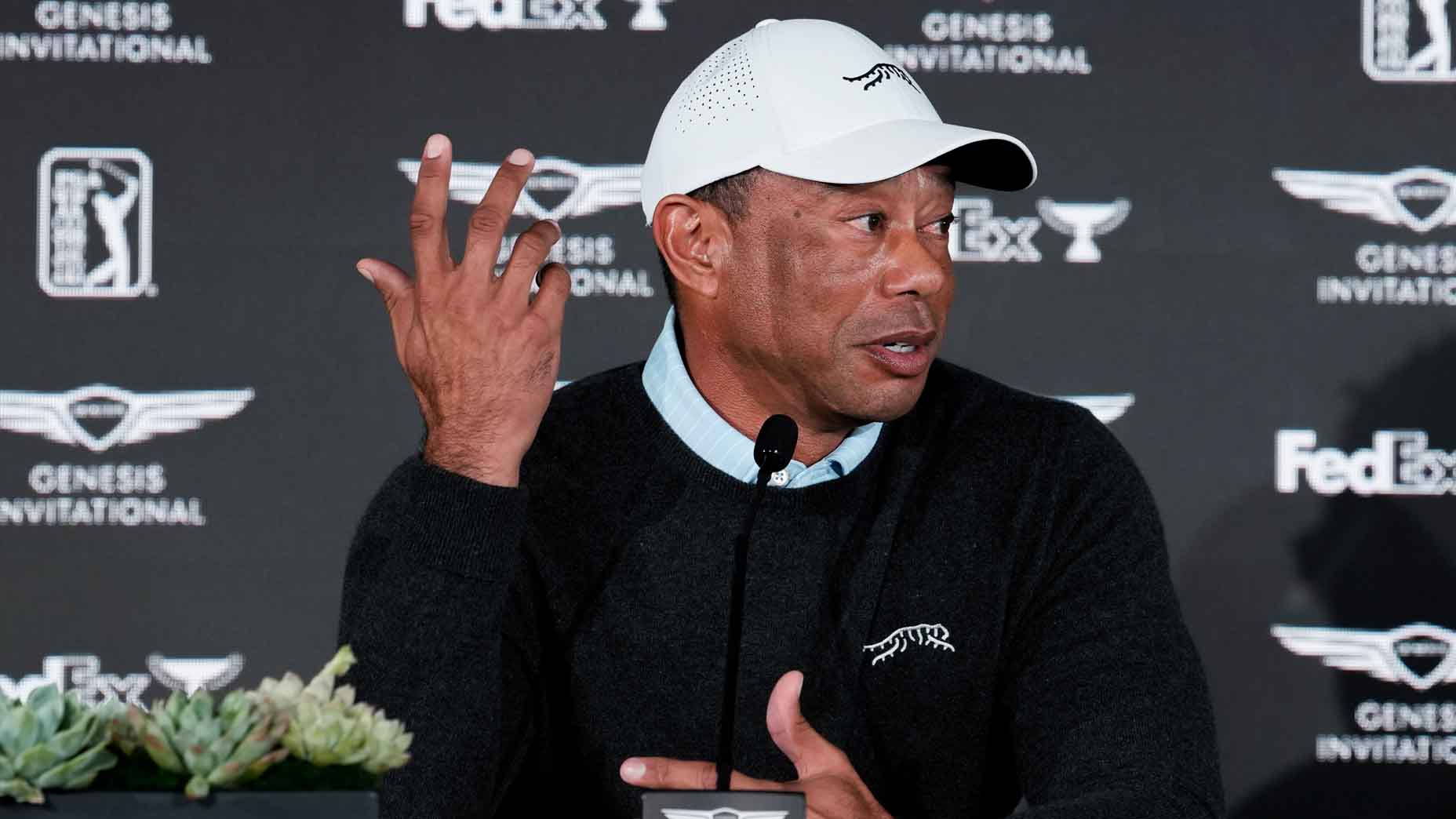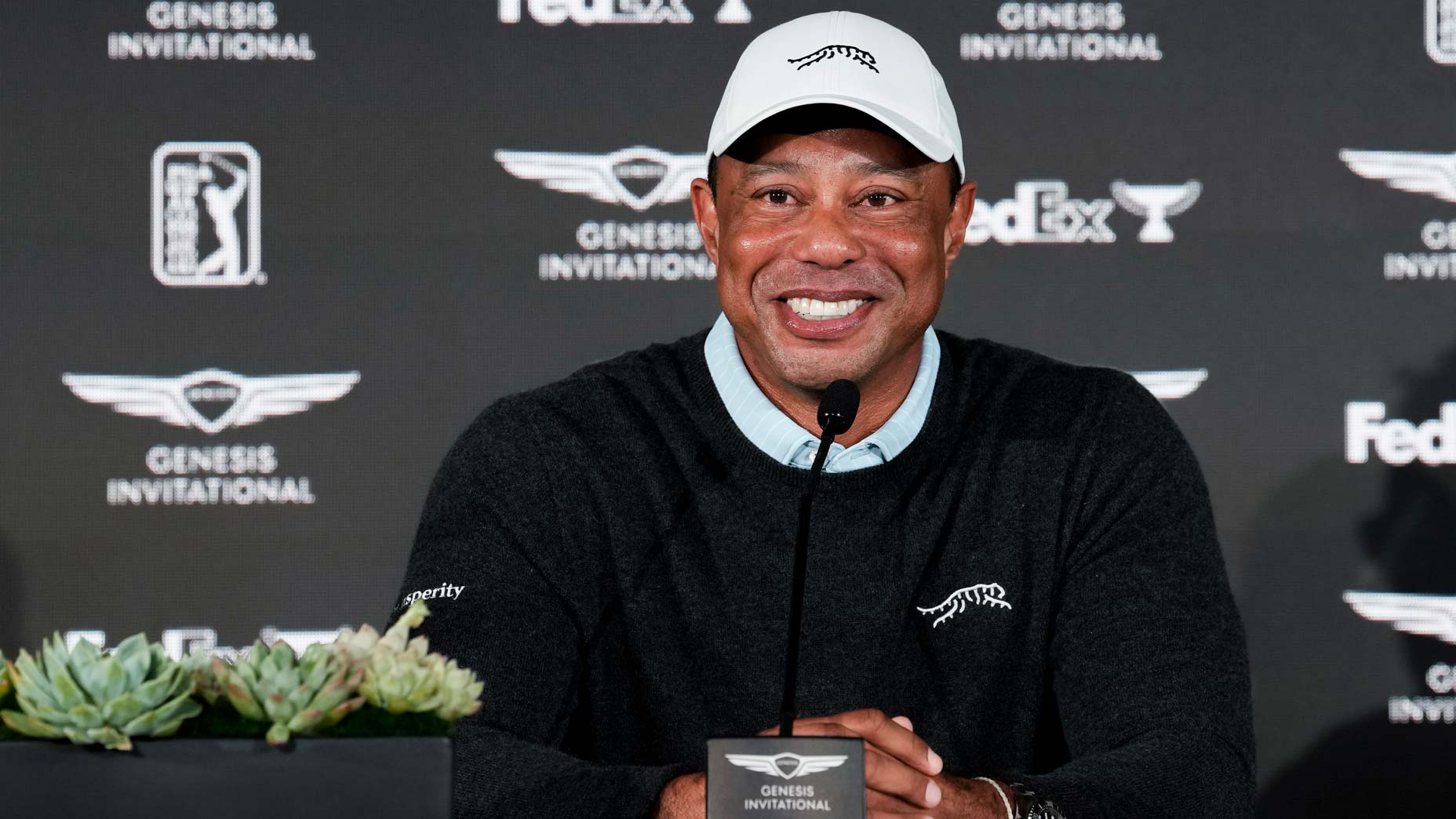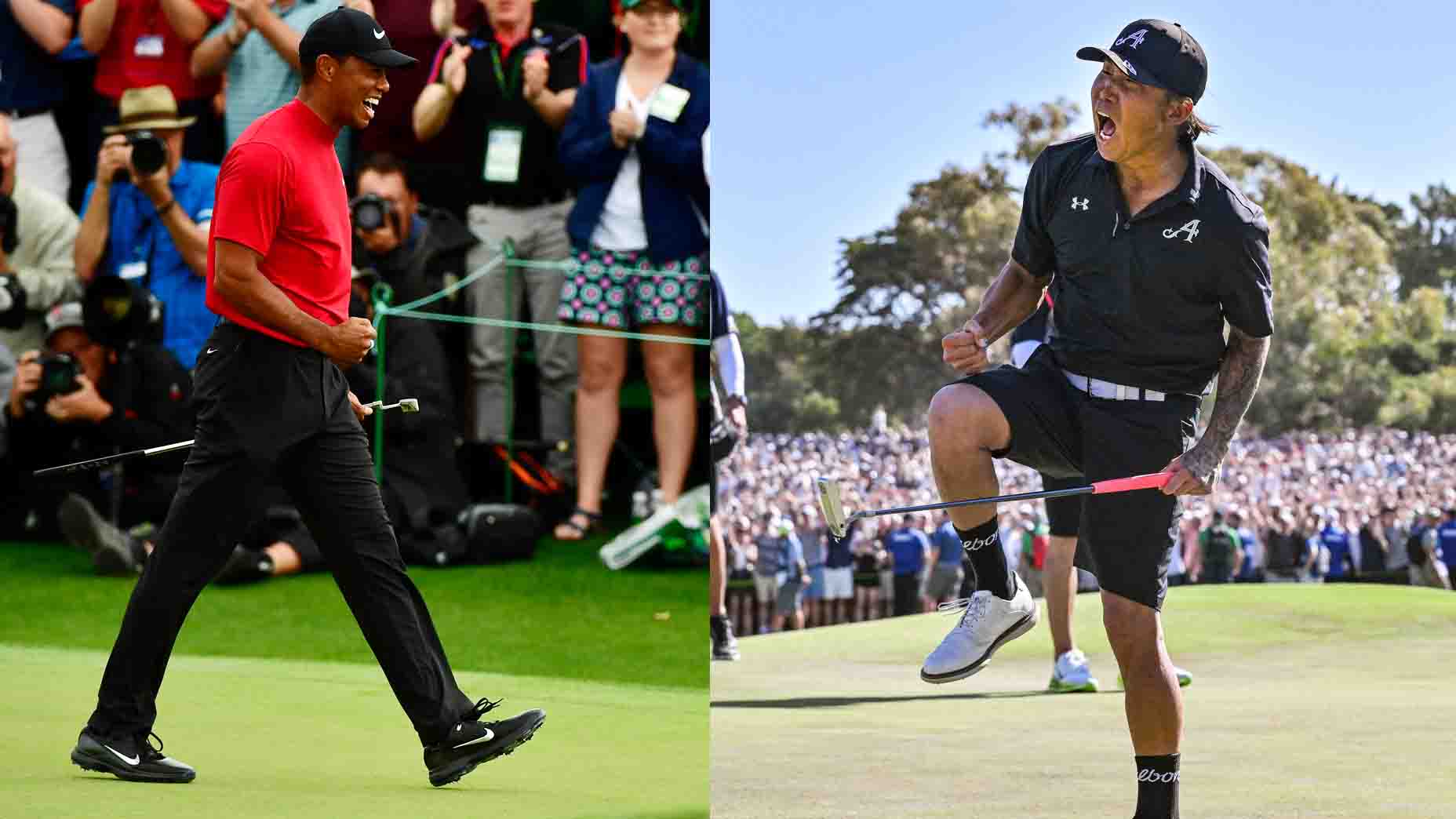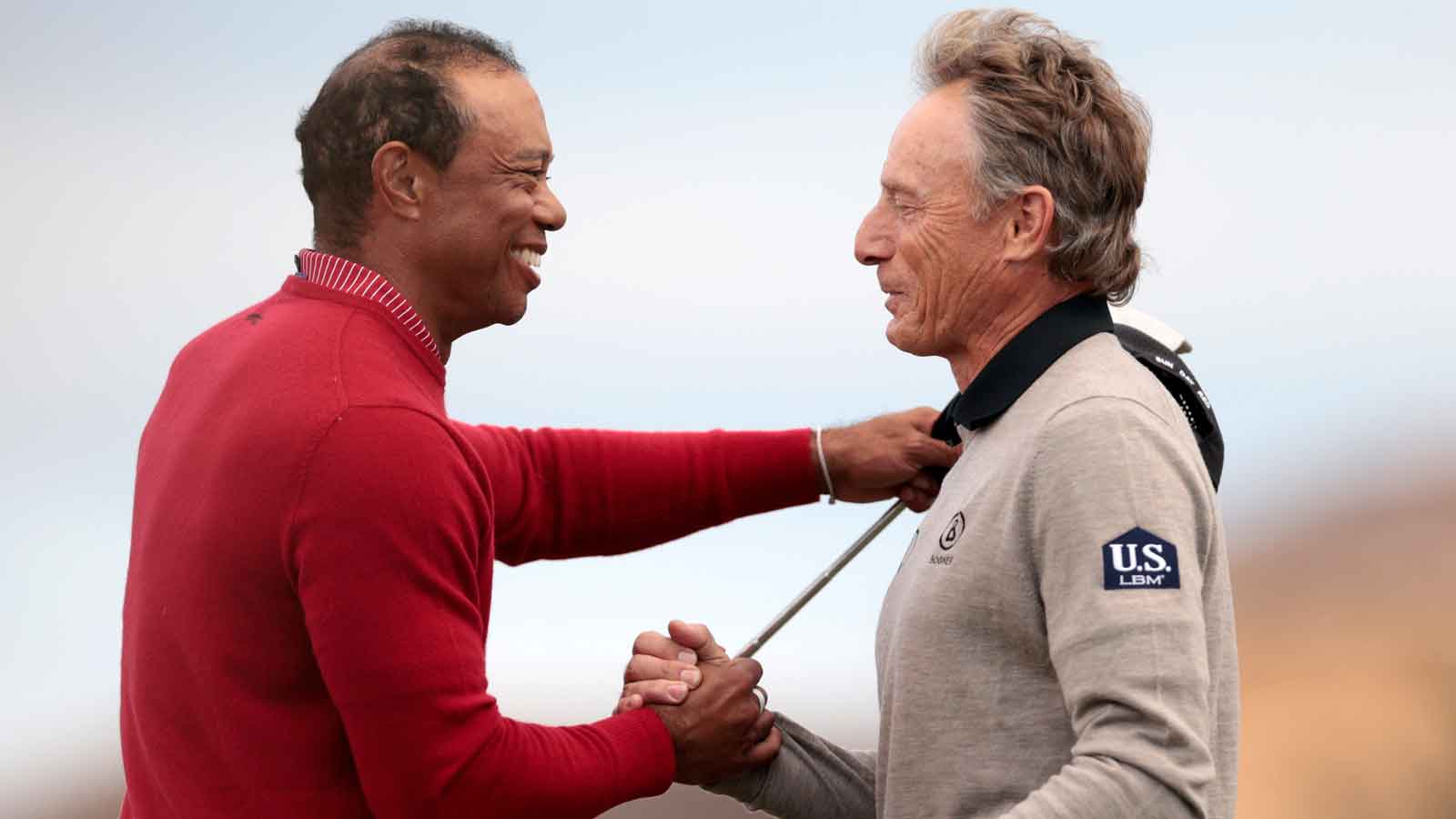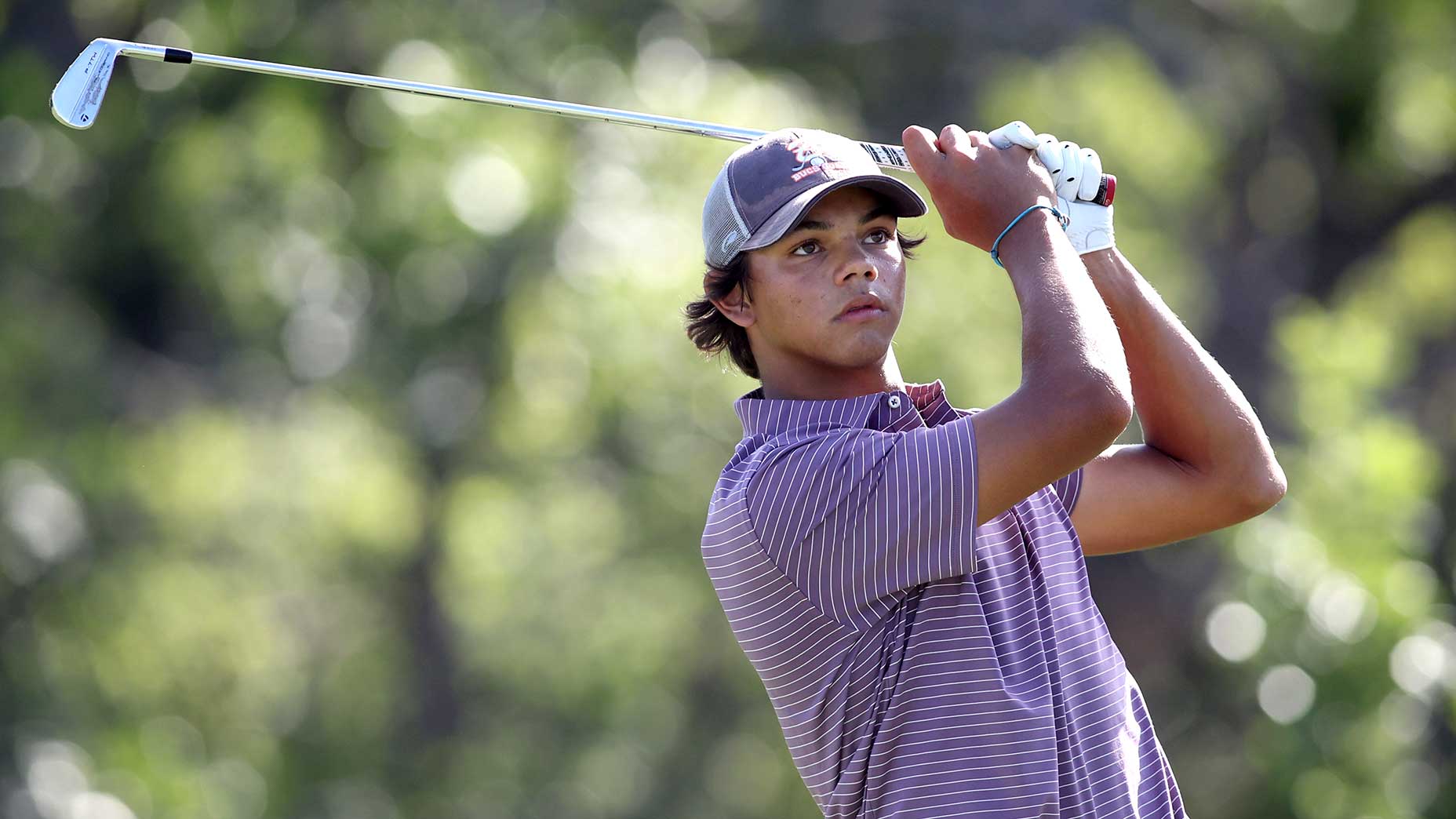Ah, 2023. The year everything changed … again. For the second straight year, we left 2023 with a drastically different perspective of professional golf than we entered. Now, as we look back at the year that was — with LIV major championships, Ryder Cup controversies and oh so many other stories — we’re remembering the 15 biggest moments that defined the year in golf. Let’s get digging.
Biggest Golf Moments of 2023 …
No. 15: Viktor Hovland’s arrival
No. 14: Fowler, Day back in the winner’s circle
No. 13: Brian Harman’s Open rout
No. 12: The Michael Block Party
No. 11: Wyndham Clark’s breakout
No. 10: Lilia Vu’s rise
No. 9: LIV Golf’s OWGR snub
No. 8: The players regain control
No. 7: Ciganda’s Spanish Solheim triumph
Biggest Golf Moments of the Year No. 6: Tiger Woods’ 2023 return
It’s Christmas Day, which seems like the right time to unwrap the greatest gift that golf fans received this holiday season: a (relatively) healthy Tiger Woods!
Woods’ 2023 began at Riviera, where he looked both promising and fragile in a T45 finish. It continued at the Masters, where he made the cut but withdrew on the weekend. Then came the announcement: subtalar fusion surgery. Silence came after. Uncertainty came with it. But then, as he’s done a handful of times before, Woods returned to competitive golf at the friendly confines of the Hero World Challenge, his event in the Bahamas. He sounded optimistic. He beat just two golfers, but still — he walked all four rounds without issue; his lack of competitiveness looked more like rust than inability.
When Woods returned to televised golf two weeks later it was alongside his son Charlie (and his daughter Sam!) at the PNC Championship. Team Woods never really contended in the two-day scramble but Tiger continued to move well, continued to speak optimistically about his playing future and pitched in plenty during their Sunday 61, second-best round of the day.
I was in the Bahamas for Woods’ return and was particularly interested in his Tuesday press conference — which has effectively served as an annual State of the Union address. This time, I thought, two things seemed different. You can find that story below.
***
ALBANY, Bahamas — It was just before 10 a.m. local time when a shiny black sedan pulled up outside the entrance of the media center. The smattering of reporters and photographers who’d been milling about, waiting for this moment, suddenly stood at attention.
He’d arrived.
The last time Tiger Woods played a golf tournament was in April at Augusta. That was the last time he made public comment, too. But that was one subtalar fusion surgery and one massive, unexpected framework agreement ago. That was before Woods seized control of a significant piece of PGA Tour leadership. And that was before he began plotting his next on-course comeback, too.
But as the car door opened, the assembled media came to a speedy, disappointing realization: whoever it was that stepped out of the car was likely a very important person, but it wasn’t Tiger Woods. That should have been no surprise. This is Albany; a gated, uber-exclusive Bahamas enclave. It may have more yachts than people. Click your heels three times and a billionaire appears. Fiji water bottles are handed out free of charge. (Fiji!) And there’s no shortage of VIPs in shiny black cars.
But then, suddenly, he appeared. A man with a fused back, a fused ankle and the upper-body physique of a newly retired NFL linebacker, Woods had somehow snuck up on the distracted crowd. A reporter and a photographer dove out of the way, a testament to the effect of his presence rather than the urgency of the situation. Woods greeted tournament host Dr. Pawan Munjal, CEO of Hero MotorCorp. And then he marched through the door and up to his seat at the podium, a familiar setting for him to explain the future of his golfing life.
THERE WAS AN ELEMENT OF DEJA VU to the proceedings. After all, this week on the golf calendar has become known as the site of Tiger Woods’ comebacks.
In 2016, the Hero is where Woods announced his comeback after more than a year away from tournament play. That proved a false start; he played just three competitive rounds in the 12 months that followed.
Still, he announced his next comeback at the Hero in 2017 and this one stuck, jumpstarting a 2018-19 stretch that featured three victories including the Masters.
In 2021 he made his first appearance at the Hero World Challenge after a horrific car crash in February of that year, teasing a return to competitive golf that came at the PNC Championship just a couple weeks later.
In 2022 he planned to play the Hero but withdrew the week of, citing plantar fasciitis. He played just two PGA Tour events in the months that followed.
Some comebacks have worked. Others haven’t. But the man and the setting felt remarkably familiar; a reminder of how much has stayed the same.
That made it even easier to notice what’s changed.
IT WAS ONLY FITTING that the first question was about money. The purse for the Hero World Challenge will jump to $4.5 million this year, up from $3.5 last year. It’ll go to $5 million next year. That may seem like small potatoes, given the eye-popping sums ponied up for various golfers and tournaments in recent years. But still, it was a sign of the times.
Another change? Woods’ optimism. While it’s clear that he doesn’t know exactly how he’ll look at the Hero — “I’m just as curious as all of you are to see what happens because I haven’t done it in a while,” he said — he provided a far rosier outlook than in years past.
The decision to return, Woods said, came after a successful stint caddying for his son Charlie in a multi-day tournament. “Caddie” is a new litmus test and a role he really enjoys.
He recovered okay, he said. He was taking beach walks and lifting weights and recovered okay from those, too.
“I can tell you this, I don’t have any of the pain that I had at Augusta or pre-[Augusta] in my ankle,” he said. “Other parts are taking the brunt of the load so I’m a little more sore in other areas, but the ankle’s good. So that surgery was a success.”
As he discussed his leg, Woods let us in on the process a bit, explaining why he’d needed the surgery to begin with. He’d put his ankle through more than his doctors had expected, expediting the need for the fusion.
“The only way to fix that was either to get it replaced or fused, and we chose the fusion,” he said. “The next part was the hard part, it was six months of doing nothing. That’s the hard part. The first couple months were really rough. But unfortunately, I’ve had experience, I’ve gone through it before and I’m here on the good side now.”
Read that: admission, vulnerability and extra detail — all in one answer! This is a different Tiger Woods, no doubt.
But the big-picture takeaway for Woods’ golf game is even rosier, given our zeroed-out expectations. He’s not overly worried about walking, a significant development given that walking was his biggest worry just a year ago. He expects to play this week and expects to play the PNC Championship in two weeks and expects to play more in 2024. He’ll have manager/right-hand man Rob McNamara caddying for him this week. Going forward?
“As far as next year, I don’t know yet. I don’t think Charlie’s going to be able to caddie. Can’t play hooky that often,” he said.
Wait a minute — how often are we talking?
“I think that best scenario would be maybe a tournament a month,” he said. “I think that’s realistic. You would have to start with maybe at Genesis and something in March near The Players. Again, we have [the schedule] set up right now so the biggest events are one per month. It sets itself up for that.”
A tournament per month! That truly would be a development, given he’s made just five starts in the last 36 months. And I’m guessing he doesn’t mean, like, every month. But a hypothetical schedule that would include the Genesis in February, the Players in March, the Masters in April, the PGA in May, the U.S. Open in June, the Open Championship in July and, if we’re leaning all the way into that optimism, a FedEx Cup Playoff event in August…? That’d be terrific.
“Now I need to get myself ready for all that,” he said. “I think this week is a big step in that direction.”
This week has become Woods’ annual State of the Union address. And the state of the union is optimistic.
BUT THESE DAYS, WOODS’ GOLF GAME is only half the story. And it’s only half the change. Woods made something else clear on Tuesday, too: He’s recognizing — and exercising — his power.
It remains unbelievable this generation’s greatest PGA Tour player was not consulted before the June 6th announcement of the Tour’s framework agreement with the Saudi Public Investment Fund. But Woods reiterated exactly that: he’d been left in the dark.
“I was very surprised that the process was what it was,” Woods said, choosing his words with care. “We were very frustrated with what happened and we took steps going forward to ensure that we were not going to be left out of the process like we were.”
He used that word — frustrated — several more times throughout. And he explained the process of ensuring he doesn’t get blindsided again, which included drafting a list of demands and then seizing a seat on the Policy Board, an important if thankless task that places him at the center of every meaningful Tour-related conversation. It’s clear that has been no small commitment.
With 3 unwavering words, Tiger Woods puts PGA Tour on noticeBy: Sean Zak
“December 31st is coming up very quickly,” he said, referencing the original deadline for the framework agreement. “So there’s the timetable there that we would like to implement some of these changes that have not taken place. The guys, all the player directors, have worked tireless hours to make sure that we have the best deal for all the players that are involved, the entire PGA Tour.”
I asked Woods if he had a clear sense of how the professional golf landscape might look in a year or two. He described things as “murky.”
“There’s a lot of moving parts on how we’re going to play,” he said. “Whether it’s here on the PGA Tour or it’s merging, or team golf. There’s a lot of different aspects that are being thrown out there all at once, and we are trying to figure all that out and what is the best solution for all parties and best solution for all the players that are involved.”
In other words, everything is on the table. Woods wants to protect the integrity of the Tour while making sure its books are healthy. He hinted that the Tour could get a deal done with or without the PIF.
“There are a lot of different options,” he explained. “A lot of different parts that are moving, trying to get a deal done, whether it’s from all different types of money, what that looks like. But we have to protect what the Tour is for the players.”
That part really struck me. Woods stressed the idea of “process.” He emphasized that a deal should be done “the right way.” He made a pointed comment that PGA Tour commissioner Jay Monahan knows another shocker “can’t happen again and won’t happen again.” He emphasized that that’s what drove him to join the board: “control.” But what does he want to happen? What does he really value? And what, specifically, about the PGA Tour makes it so worth protecting?
He paused before answering.
“What we have to do is we have to make sure that we have access to the game,” he said. “I had an ability to get on Tour. We ensure that and ensure that we protect our schedule and our Tour and take care of the players. Without the players, there is no Tour. How do we take care of them in a better way, not just financially? Obviously everyone wants to get paid, but how do we have the best competitive atmosphere and competitive events from week to week to week? And what does that look like? And what does it look like for the players to have to be involved? What do they have to give up to have that? And what are investors looking for to invest in our Tour?”
It was a good response, even if he’d answered my question with a half-dozen questions of his own. That’s a sign of the times, too.
Woods is fully absorbed in this process; he shut down the idea that he’d be mulling a 2025 Ryder Cup captaincy because, at present, there’s “too much at stake” requiring his focus. (Jordan Spieth corroborated that idea later on, suggesting that Woods is spending “most of his waking hours” thinking about the betterment of the Tour.) And he made sure to emphasize that above all, he wants to get a deal done, whether by the end of 2023 or later.
“I am confident a deal will get done in some way. Whether that comes December 31 or is pushed back, all sides understand we’re working together,” He said. “There are no lawsuits. Everyone’s understanding what that looks like and we’re all progressing going forward. Everyone’s working right now with no animosity. We’re trying to work to try and get a deal done for the Tour and for all parties involved.”
THE MOST REVEALING MOMENT OF THE SESSION came near the end, when Woods was asked about Rafael Nadal, who’s plotting his own comeback in 2024.
“Well, I think what Rafa’s done is extraordinary,” he said. “I mean, he won the Australian Open on a broken foot. The guy’s beyond tough and beyond competitive. He knows that Father Time is here. Every athlete faces it. Although some sports it happens faster than others, unfortunately just like every sport you get aged out. I don’t want to see him go. I never wanted to see [Roger Federer] go, but that’s what happened. We should all enjoy watching him compete and watching him play and what he’s meant to the game, what he’s meant to all of us, just to see the passion of how he plays and why he plays.”
That felt like a window into Woods’ soul because, if you change a few details, it’s not just an answer about Nadal. It’s an answer about Woods. It’s an answer about how he’d like to be perceived. We should enjoy watching him compete and watching him play. We should enjoy what he’s meant to the game. We should appreciate the fact that he’s still out here, pushing 48 years old, battling 20 of the best golfers in the world.
Woods can recognize that in another legendary athlete who’s waging war on injury and time. He just might not be able to appreciate that in himself. He’s got a few other things going on at the moment.
Dylan (cautiously) welcomes your comments at dylan_dethier@golf.com.
